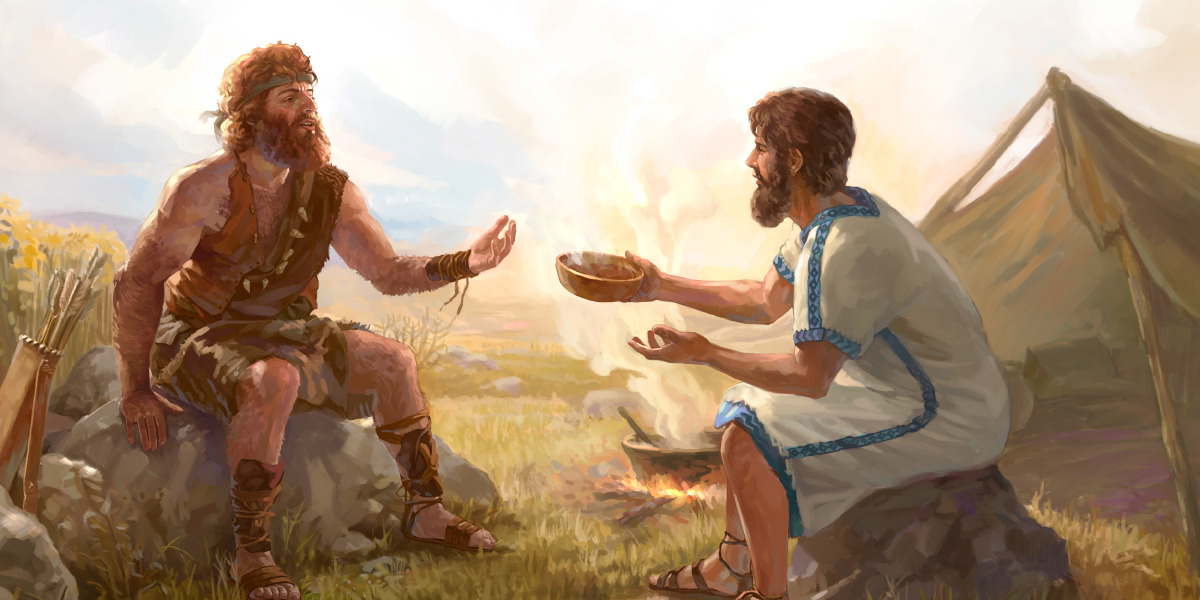
Sometimes caffeine helps my faith.
Well, it's probably the Holy Spirit. But I'm sure He works through caffeine.
Oops. There I go again. Just as I typed that last sentence, I realized that I'm grasping for what I'm about to describe: Control. It's a hamster wheel with me; I'm constantly constantly attaching His power to some set of actions I perform. My contribution to any of His successes is microscopic at best, yet I persist in believing in my own significance.
It's silly, right? Silly enough to form the topic of an essay. But I'd much rather write about the silliness of others. So let's examine two silly twin, instead.
These twins, Jacob and Esau, operated from opposite ends of the spectrum. Esau, red and hairy, reveled in the moment, in meat, and in old-fashioned brute force. Think of an ancient-times Thor, impetuous and bold. Smooth-skinned Jacob, on the other hand, relied on his own strength of mind. Throughout his life, he bargained with God and with people, maneuvering himself into a positions of power, unable to give or accept a free handout, and always grasping for more.
It's on that last bit that both brothers agreed; the driving desire for the best. Esau sold off his birthright, yet expected his father's blessing. Jacob stole Esau's hopes, yet still found the chutzpah to place conditions on his allegiance to the Almighty. Different approaches, same goal: SECURE MY BEST LIFE, NOW.
- Esau demanded it in his desperation for food ("Let me eat ... I am about to die; of what use is a birthright to me?" [Gen. 25:30-32]).
- Jacob bartered for it in His proposed agreement with God ("If God will be with me ... then the Lord shall be my God." [Gen. 28:20-22])
But why? Why shrug off a birthright when you know you're the firstborn in a God-chosen family with a low likelihood of God "accidentally" letting you die of starvation? Why bargain for God's protection after He's promised unconditional provision just a few moments before? (Gen. 28:15).
It seems silly, indeed, but also uncomfortably close to home.
- I assume certain death immediate access to chocolate, a long walk, or a short nap -- not to mention deeper things like friendship or marital peace. I shrug off my faith in favor of instant, incomplete relief.
- I mistake God's covenant of salvation for a contract: He proves His goodwill via certain blessings, and then I'll sign the deal.
Yes, the "silliness" of these twins resonates deep, resonates true. I may not seek control by exchanging my birthright for red stew -- I'd choose cheesy broccoli over that, any day -- but I operate with the same shortsighted urgency when my favorite craving go unmet. I may not spell out my terms for allegiance with the boldness of Jacob, but I keep silent track in my mind: I chose self-denial. Where's my reward? I want it now.
Do you see the irony? When I read the story of these silly twins, I can no longer merely observe. I realize I live them, each day.
This year, I long to release my intense (and false) grip on Control, to cease my constant struggle for more, in exchange for an open-handed acceptance of what is.
God's faithfulness ... is.
God's strength ... is.
God's covenant ... is.
God's grace ... is.
No struggle. No contract. No brute force required. These gifts are free, given in love, and my one job is plain. Accept them. Believe them. And live like I know that they're real.
Yes, even more real than the fading buzz of this morning's caffeine.